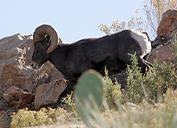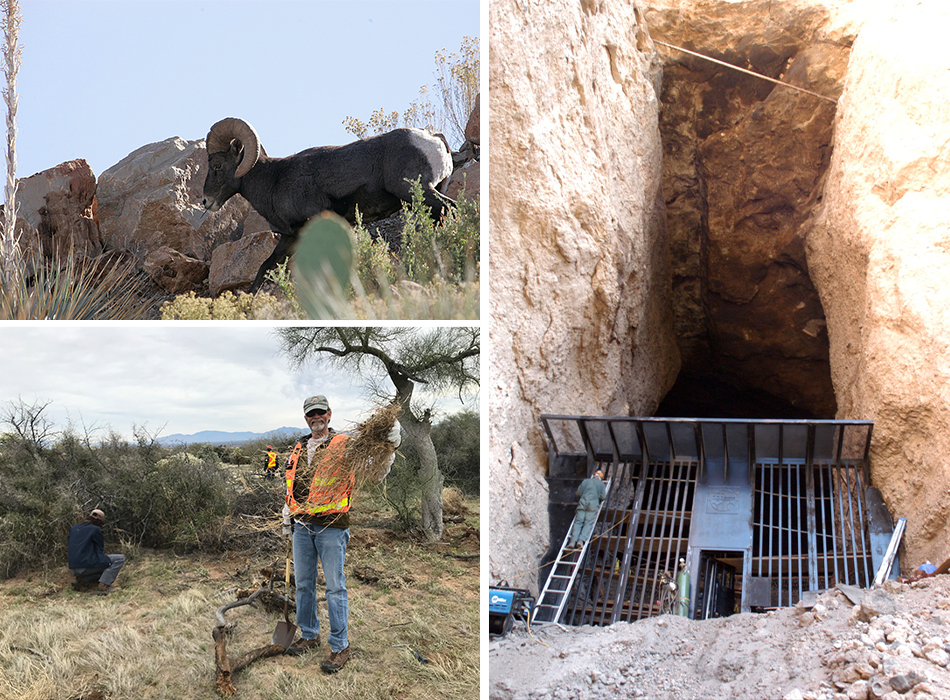Company Conservation Work Garners Five Top Wildlife Habitat Council Awards

July 12, 2022 - Freeport-McMoRan’s work to protect animals ranging from bats to bighorn sheep has earned the company five top awards from the Wildlife Habitat Council at the WHC’s annual conference held in Detroit in June.
WHC is a nonprofit organization that promotes and certifies conservation, restoration and education efforts on corporate lands. Freeport has been a WHC member since 2006, and Bill Cobb, Vice President and Chief Sustainability Officer, has been a member of WHC’s Board of Trustees since 2012. Seventeen of the company’s operations and facilities currently are certified through WHC, 12 of which are Gold Tier-certified, the highest level of recognition. A WHC certification formally recognizes meaningful biodiversity management, environmental education and community outreach programs on corporate landholdings.
While the awards recognize conservation efforts worldwide, all of Freeport’s winners this year are based in Arizona. Sierrita and Morenci each received two awards, and the United Verde operation in Clarkdale received one award during the presentations.
While the awards are an important external recognition of the company’s efforts, the more important aspect is the on-the-ground conservation projects and associated employee engagement the company is performing at various sites in collaboration with WHC, Cobb said. Freeport works closely with the WHC experts on conservation efforts, and many of the company’s operations worldwide have received the organization’s awards in prior years. (Cerro Verde won two awards at last year’s virtual conference.)
“Conservation and habitat restoration work will become more important and imperative as our stakeholders broaden their interests from climate change and impacts to water supplies and then to impacts to nature and biodiversity”, said Cobb, a former WHC board chairman. “There will be expectations that we both document our prior efforts but also provide action plans for future efforts. Our historical WHC programs provide a good base for addressing these pending stakeholder interests and concerns.”
Freeport’s winning projects this year are:
- Sierrita: Enhancing Bat Pollinator Habitat at West Desert Trails, recipient of the Desert Project Award. Sierrita collaborated with conservation partners at Bat Conservation International and Borderlands Restoration Network to plant hundreds of native agaves on the West Desert Trails, an 1,800-acre area of company-owned property that is open to the public for recreation. These agaves support nectar-feeding bat species that migrate between Central Mexico and the southwestern United States.
- Sierrita: Buffelgrass education and management, recipient of the Community Engagement Project Award. Working with the Arizona-Sonora Desert Museum, the company hosted "Beat Back Buffelgrass” events in which community volunteers removed the noxious invasive species from West Desert Trails.
- Morenci: Eagle Creek Bat Cave Habitat Protection and Management, recipient of the Caves and Subterranean Habitats Project Award. Since protecting the Eagle Creek Bat Cave in 2010, Morenci staff and experts at Bat Conservation International have worked to manage this resource. The cave houses a significant population of Mexican free-tailed bats, a species that is in decline throughout its range. Eagle Creek is one of the largest maternity roosts for these bats in the southwest.
- Morenci: Rocky Mountain Bighorn Sheep Management, recipient of the Mammals Project Award. Morenci staff partners with the Arizona Game and Fish Department and other stakeholders to proactively manage the local population of Rocky Mountain Bighorn Sheep.
- United Verde: Christmas Bird Counts at Peck's Lake, recipient of the Training Project Award. Employees at the discontinued United Verde facilities in Clarkdale have partnered with the Northern Arizona Audubon Society since 2004 to conduct Christmas Bird Counts at Peck’s Lake, part of the Tuzigoot Important Bird Area.
James Hogan, Environmental Specialist II, has been involved with both Morenci projects for more than a dozen years and said it is gratifying they are being recognized by the WHC. The aim of the bat and bighorn sheep effort is to protect both species from potentially dangerous human interactions such as traffic collisions, which helps ensure that stable populations in the area are maintained, he said.
The bats are vital to the ecosystem, devouring mosquitos and crop pests. Bighorn sheep often are removed from the Morenci population and relocated to other areas of the state to improve the numbers in those areas. So, the benefits of the conservation work being done in Morenci extend throughout the region.
“Our team at Morenci works hard to manage the populations of both species so that are able to thrive,” Hogan said.

Photos (clockwise): A Rocky Mountain bighorn sheep makes its way along a ridge near the Morenci mine. The company has long partnered with the Arizona Game and Fish Department to protect the animals; The Eagle Creek Bat Cave near the Morenci mine is protected by a special gate that allows bats access but prevents unauthorized visitors from disturbing their habitat; John Stitzer, Senior Resource Analyst, displays a handful of buffelgrass he pulled from the West Desert Trails in Sierrita. Removal of the invasive species was recognized with a recent WHC award.



 BACK
BACK
SOCIAL
RECOGNITION